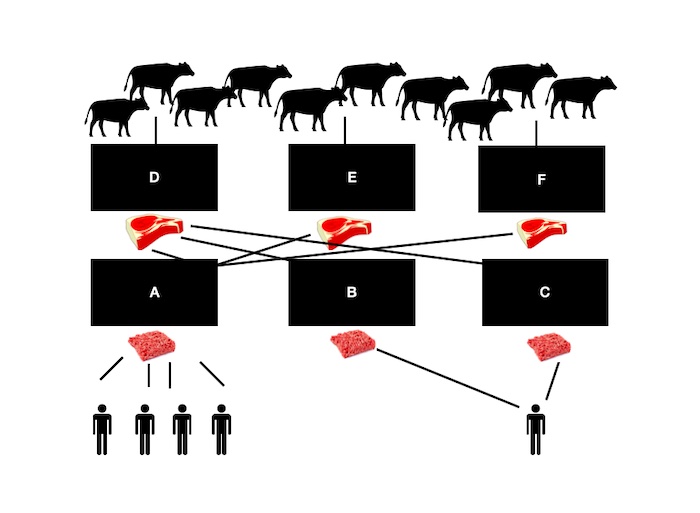In 2019, an E. coli outbreak that sickened five people was linked to ground beef sold at New Seasons Market stores and other retailers. The serotype associated with the outbreak, E. coli O157: H7, produces a kind of poison called a Shiga toxin which causes a more severe illness than other E. coli strains including a life-threatening complication called hemolytic uremic syndrome (HUS), a form of kidney failure.
Here’s how it happened, according to an after-action report from the U.S. Department of Agriculture’s Food Safety and Inspection Service (USDA FSIS).
Contact the Pritzker Hageman E. coli Team
Phone: 1-888-377-8900 | Text: 1-612-261-0856
There are six companies mentioned in this report, three slaughterhouses referred to as Establishment D, E and F; and three grocery stores referred to as Retailers A, B and C. New Seasons Market, Retailer A, is the only company named in the report and the only one that issued a recall.
In November 2019, Establishment D provided cuts of meat to all three retailers. New Seasons Market (Retailer A) also received cuts of beef from Establishment E and Establishment F, identified as an “eligible importing foreign-country establishment.” Retailers B and C also received beef from other sources, but they aren’t named.
The Establishment D beef that was distributed to Retailers A, B and C, was meant to be sold as intact cuts but all three retailers ground the beef and sold it. This is a problem for two reasons. E. coli and other bacteria live on the surface of cuts of meat and are usually killed during the cooking process. When beef cuts are ground, the bacteria that was on the surface gets distributed throughout the mix. Because of this, when establishments produce beef intended for nonintact use, they apply more stringent controls for E. coli O157:H7 than they do for intact cuts of beef.
So, the meat in question that came from Establishment D was not produced with stringent controls for E. coli. That’s the first problem. The second problem is that two of three retailers (Retailers A and B) that received the meat did not implement their own additional controls for E. coli when they ground the meat.
Not surprisingly then, five customers who bought this ground beef developed E. coli infections. Four of them purchase the ground beef from New Seasons Market stores, the fifth patient purchased ground beef from both Retailer B and Retailer C.
When the illnesses were discovered and investigators traced back the purchases, they discovered that in addition to skirting E. coli controls from beef grinding, Retailers A and B did not maintain proper grinding records making to very difficult for investigators to quickly determine the origin of the meat that went into each batch of ground beef. They also learned that New Seasons Market Retailer didn’t know the beef was intended for intact use because the Establishment D didn’t forward the bill of lading stating which stated the intended use.
USDA was able to determine that three samples of ground beef collected by Oregon health officials from New Seasons Market that were ground from intact cuts from Establishment D tested positive for the outbreak strain of E. coli O157:H7.
The people sickened in this outbreak ranged in age from 8 to 90 years old and were residents of Oregon or Washington. If you were sickened and need help, contact our E. coli attorneys.
The E. coli lawyers at Pritzker Hageman represent people nationwide who have been sickened by contaminated food. Recently they secured a $7.5 million settlement for one client sickened by E. coli. If you are part of this outbreak, we want to represent you. For a free consultation, call us at 1-888-377-8900, text us at 612-261-0856 or, fill out the form below.
